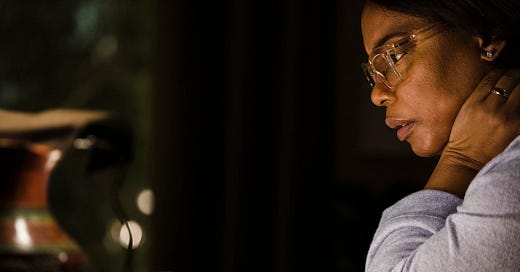Origin
Ava DuVernay's ambitious but uneven feature about one woman's journey to write a transformational book on human division while dealing with unspeakable personal tragedy.
Even if you’re not a fan, you’ve got to respect “Origin” for taking big swings as a piece of filmmaking.
Writer director Ava Duvernay (“Selma,” “A Wrinkle in Time”) takes on the creation of the book, “Caste: The Origins of Our Discontents” by Isabel Wilkerson. It’s an ambitious tome with a very big-think thesis, attempting to tie the racial hatred of Black Americans with the genocide of the Jews by Nazi Germany and the caste system of India that renders millions of human beings as “untouchables.”
From the jump, making a movie about the writing of a book is a tough hurdle to clear. Writers by definition spend most of their time alone, hunched over tapping away on a keyboard or in some dusty library doing research. Strictly from a stuff-happening-on-screen vantage point, it’s terrifyingly dull stuff.
Duvernay makes a valiant attempt, and there are moments of “Origin” that are truly riveting. It’s also a sprawling, occasionally turgid mess that feels like a series of vignettes in search of a story.
Aunjanue Ellis-Taylor (“King Richard”) plays Isabel, a journalist-turned-author who as the story opens has already published a best-seller, “The Warmth of Other Suns,” that garnered her much admiration and invitations to speak at highfalutin gatherings. She accepts the warmth and regard from her mostly white collaborators and benefactors.
In her personal life, she’s blessed with a strong, loving marriage to Brett (Jon Bernthal), a white man who seems to have a clue, and challenged by an elderly mother, Ruby (Emily Yancy), with rapidly deteriorating health. Isabel and her mother have just made the mutual decision to have her move from living with her daughter to a senior care facility, so she’s experiencing a combination of guilt and separation.
The precipitating event that launches the new book project is the killing of Trayvon Martin in Florida by a self-appointed Latino vigilante (not far from my hometown). Isabel is urged to weigh in by her publishers and friends, but she resists, saying she’s ready to take a step back.
But then twin tragedies are visited upon her — of unspeakable dimensions — and after a dark period of healing and contemplation, Isabel decides to start picking at the scab of racial hatred.
(I’ll pause her to note that Duvernay’s cinematic depiction of the event contradicts many verifiable facts of that tragic encounter. To wit: showing Martin’s antagonist approaching him with gun already drawn, and the teen dying while pinned to the ground and screaming for help, instead of on top of the man repeatedly bashing his head into the ground. It’s either deliberately obfuscating or deeply blinkered, and makes for a poor launch of a story about closing human divisions.)
From there, the movie wanders through the various inspirations and ideas that help Isabel formulate the book. She gets support from Marion (Niecy Nash), more like a sister than a cousin, who acts as a touchstone to her roots and admonishes her to speak to people at eye level rather than relying on byzantine academia-speak.
This leads to the long vignettes portion, some of which work really well and some that don’t. I was incredibly moved by one old man’s anecdote about his childhood baseball team getting rewarded with a day at the community pool, but their one Black teammate was forced to sit on the other side of the fence, estranged.
Ditto for Miss Hale, a Black woman who moved to the South as a child and was admonished by her school principal that he knew she wasn’t from around there because she looked him in the eye.
Other pieces of the puzzle feel hurried-over, like the story of a young couple of Black anthropologists who spent time in 1930s Germany and decided to study American racism as living lab rats. The India section about scholar B. R. Ambedkar and his advocacy for fellow Dalits, or those who live below the caste system, similarly has a tacked-on feel.
I say this while also holding that opinion that the movie is far too long at 140 minutes. Some of the middle sections can be downright tedious.
Duvernay and her cast gather things up better toward the end, and the disparate threads weave themselves together into something that’s at least graspable, if lacking much emotional punch. It’s obviously hard for most audiences to parse the meaning of a term like endogamy in the context of Black lynchings and Jews in ovens. (I had to look it up.)
If it’s possible to respect a movie without really liking it, then “Origin” was that experience for me. I’ve not read Isabel Wilkerson’s book, but am now intrigued to do so. There are worse things for a movie to accomplish.





